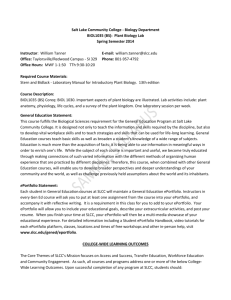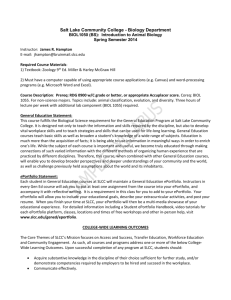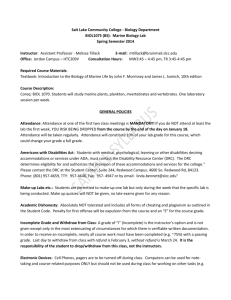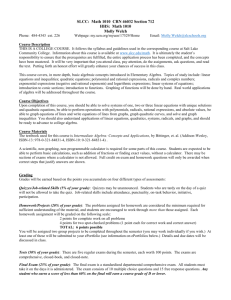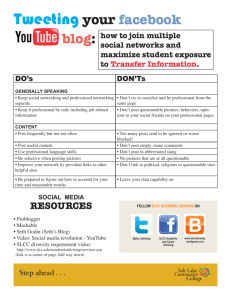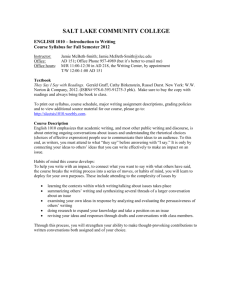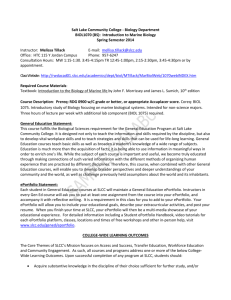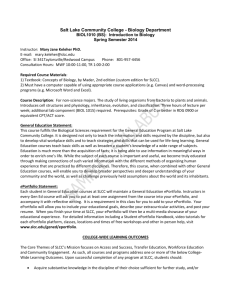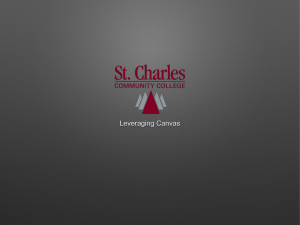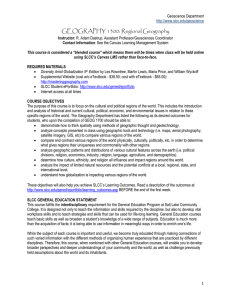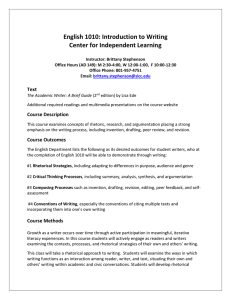BIOL 1615 Sample Syllabus - Salt Lake Community College
advertisement
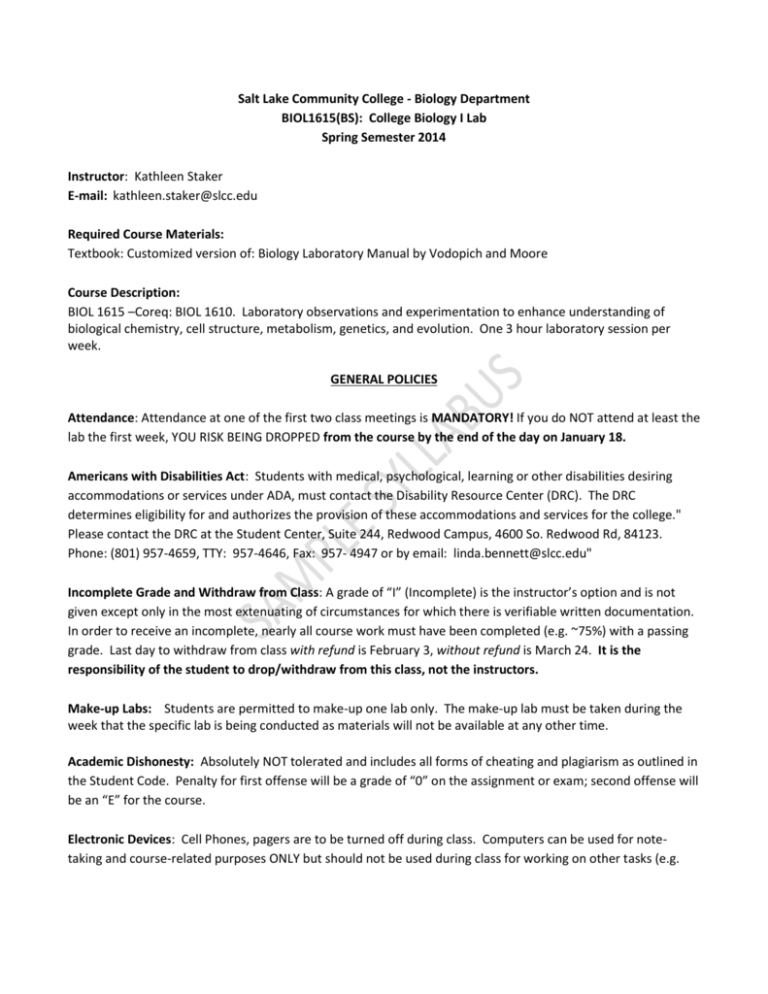
Salt Lake Community College - Biology Department BIOL1615(BS): College Biology I Lab Spring Semester 2014 Instructor: Kathleen Staker E-mail: kathleen.staker@slcc.edu Required Course Materials: Textbook: Customized version of: Biology Laboratory Manual by Vodopich and Moore Course Description: BIOL 1615 –Coreq: BIOL 1610. Laboratory observations and experimentation to enhance understanding of biological chemistry, cell structure, metabolism, genetics, and evolution. One 3 hour laboratory session per week. GENERAL POLICIES Attendance: Attendance at one of the first two class meetings is MANDATORY! If you do NOT attend at least the lab the first week, YOU RISK BEING DROPPED from the course by the end of the day on January 18. Americans with Disabilities Act: Students with medical, psychological, learning or other disabilities desiring accommodations or services under ADA, must contact the Disability Resource Center (DRC). The DRC determines eligibility for and authorizes the provision of these accommodations and services for the college." Please contact the DRC at the Student Center, Suite 244, Redwood Campus, 4600 So. Redwood Rd, 84123. Phone: (801) 957-4659, TTY: 957-4646, Fax: 957- 4947 or by email: linda.bennett@slcc.edu" Incomplete Grade and Withdraw from Class: A grade of “I” (Incomplete) is the instructor’s option and is not given except only in the most extenuating of circumstances for which there is verifiable written documentation. In order to receive an incomplete, nearly all course work must have been completed (e.g. ~75%) with a passing grade. Last day to withdraw from class with refund is February 3, without refund is March 24. It is the responsibility of the student to drop/withdraw from this class, not the instructors. Make-up Labs: Students are permitted to make-up one lab only. The make-up lab must be taken during the week that the specific lab is being conducted as materials will not be available at any other time. Academic Dishonesty: Absolutely NOT tolerated and includes all forms of cheating and plagiarism as outlined in the Student Code. Penalty for first offense will be a grade of “0” on the assignment or exam; second offense will be an “E” for the course. Electronic Devices: Cell Phones, pagers are to be turned off during class. Computers can be used for notetaking and course-related purposes ONLY but should not be used during class for working on other tasks (e.g. answer emails, Facebook, other classes etc.). You will be asked to leave if your electronic device disrupts the class in anyway. Cell phones MUST be turned completely OFF during quizzes and exams. Classroom recordings: Students may not record or publish information from the class without written authorization from the instructor. If used without authorization you have violated Privacy/Intellectual Property Rights. Student Code of Conduct: The student is expected to follow the SLCC Student Code of Conduct found at http://www.slcc.edu/policies/docs/Student_Code_of_Conduct.pdf EVALUATION/GRADING Laboratory performance will be assessed on the basis of lab participation, lab quizzes, and a writing assignment. The laboratory score constitutes twenty percent (20%) of the student’s final BIOL1610 grade. Students are expected to attend and participate in laboratory each week. Students should read the lab manual prior to lab so as to use their limited time in lab to full advantage. Laboratory methodologies will vary from week to week, depending upon the nature of the laboratory exercise, but will include both individual and collaborative efforts. The laboratory includes both quantitative and qualitative exercises. The written assignment will count as the BIOL1610/1615 signature assignment for the ePortfolio. Lab Grading: Participation: Weekly Quizzes: Writing Assignment: Total possible points: 60 pts. 110 pts. 30 pts. 200 pts. General Education Statement: This course fulfills the Biological Sciences requirement for the General Education Program at Salt Lake Community College. It is designed not only to teach the information and skills required by the discipline, but also to develop vital workplace skills and to teach strategies and skills that can be used for life-long learning. General Education courses teach basic skills as well as broaden a student’s knowledge of a wide range of subjects. Education is much more than the acquisition of facts; it is being able to use information in meaningful ways in order to enrich one’s life. While the subject of each course is important and useful, we become truly educated through making connections of such varied information with the different methods of organizing human experience that are practiced by different disciplines. Therefore, this course, when combined with other General Education courses, will enable you to develop broader perspectives and deeper understandings of your community and the world, as well as challenge previously held assumptions about the world and its inhabitants. ePortfolio Statement: Each student in General Education courses at SLCC will maintain a General Education ePortfolio. Instructors in every Gen Ed course will ask you to put at least one assignment from the course into your ePortfolio, and accompany it with reflective writing. It is a requirement in this class for you to add to your ePortfolio. Your ePortfolio will allow you to include your educational goals, describe your extracurricular activities, and post your resume. When you finish your time at SLCC, your ePortfolio will then be a multi-media showcase of your educational experience. For detailed information including a Student ePortfolio Handbook, video tutorials for each ePortfolio platform, classes, locations and times of free workshops and other in-person help, visit www.slcc.edu/gened/eportfolio. COLLEGE-WIDE LEARNING OUTCOMES The Core Themes of SLCC’s Mission focuses on Access and Success, Transfer Education, Workforce Education and Community Engagement. As such, all courses and programs address one or more of the below CollegeWide Learning Outcomes. Upon successful completion of any program at SLCC, students should: Acquire substantive knowledge in the discipline of their choice sufficient for further study, and/or demonstrate competencies required by employers to be hired and succeed in the workplace. Communicate effectively. Develop quantitative literacies necessary for their chosen field of study. Think Critically. Develop the knowledge and skills to be civically engaged, and/or to work with others in a professional and constructive manner. COURSE LEARNING OUTCOMES In order to full-fill the goals of the College-wide Learning Outcomes, the following course learning outcomes have been established for this course. Upon completion of this course a person educated in College Biology I Lab should be able to demonstrate a general understanding of the following essential learning outcomes: Students will be introduced to and participate in hands-on activities that will assist them in understanding the major unifying themes of biology. These themes include: The domain and process of science The chemical basis of life The cell as the basic unit of life Evolution and the diversity of life DNA and the continuity of life The interrelationships of living organisms The concept of organizational levels and emergent properties of life A person educated in College biology lab should have an understanding of the following essential concepts: Principles and applications of the scientific method. Basic microscopy. The metric system. The chemical and physical nature of life and the applicability of physical laws. The inheritance and continuity of life (DNA, genetics and cellular reproduction). Structure, function, and development at the molecular, cellular, and organismal levels. The patterns and processes of evolution and the resulting diversity of life. LABORATORY SCHEDULE Week of: Jan13-17 Experiment: Intro, Safety Rules Exercise #2 Measurements in Biology Pages: VIII-XII Pages 11-20 Jan 20 Jan 21-25 Holiday-Martin L King Jr. Exercise # 3 – The Microscope Pages 21-32 Jan 27 – Feb 1 Feb 3-8 Exercise #4 The Cell Exercise #5- Solutions, Acids, and Bases Bring Article to Lab Exercise # 6 : Biological Importance of Molecules President’s day Holiday Exercise #7 – Separating Organic Compounds Exercise #8 - Spectrophotometry Bring Outline to Lab Exercise # 9 – Diffusion and Osmosis No Classes-Spring Break Exercise # 11 - Enzymes Exercise # 12 Respiration Exercise # 13 Photosynthesis Exercise # 14-Mitosis Exercise # 15-Meiosis Exercise 17- Genetics Article Due date Exercise # 18-Evolution Submit Grades Pages 33-48 Pages 49-56 Feb 10-15 Feb 17-22 Feb 24-March 1 March 3-8 Mar 10-15 March 17-22 March 24-29 March 31- Apr 5 Apr 7-13 Apr 14-19 Apr 21-23 Pages 57-70 No labs Pages 71-80 Pages 81-89 Pages 93-103 Pages 113-122 Pages 125-136 Pages 137-148 Pages 149-158 Pages 159-169 Pages 179-192 Pages 193-203
